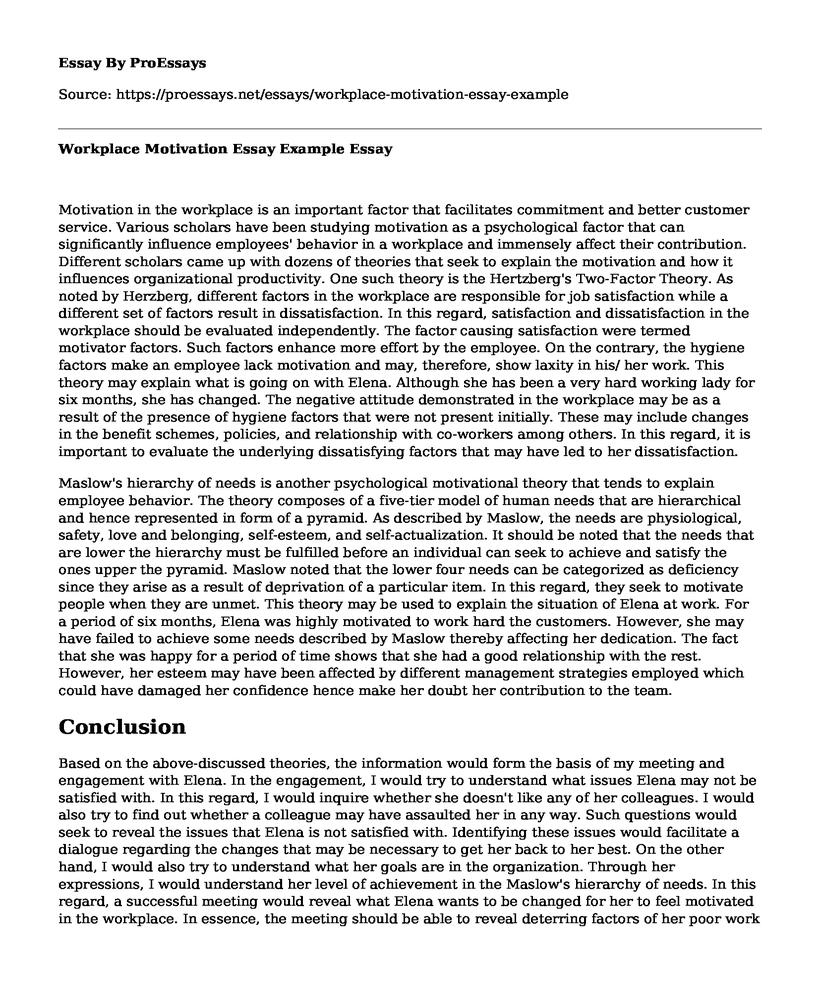Motivation in the workplace is an important factor that facilitates commitment and better customer service. Various scholars have been studying motivation as a psychological factor that can significantly influence employees' behavior in a workplace and immensely affect their contribution. Different scholars came up with dozens of theories that seek to explain the motivation and how it influences organizational productivity. One such theory is the Hertzberg's Two-Factor Theory. As noted by Herzberg, different factors in the workplace are responsible for job satisfaction while a different set of factors result in dissatisfaction. In this regard, satisfaction and dissatisfaction in the workplace should be evaluated independently. The factor causing satisfaction were termed motivator factors. Such factors enhance more effort by the employee. On the contrary, the hygiene factors make an employee lack motivation and may, therefore, show laxity in his/ her work. This theory may explain what is going on with Elena. Although she has been a very hard working lady for six months, she has changed. The negative attitude demonstrated in the workplace may be as a result of the presence of hygiene factors that were not present initially. These may include changes in the benefit schemes, policies, and relationship with co-workers among others. In this regard, it is important to evaluate the underlying dissatisfying factors that may have led to her dissatisfaction.
Maslow's hierarchy of needs is another psychological motivational theory that tends to explain employee behavior. The theory composes of a five-tier model of human needs that are hierarchical and hence represented in form of a pyramid. As described by Maslow, the needs are physiological, safety, love and belonging, self-esteem, and self-actualization. It should be noted that the needs that are lower the hierarchy must be fulfilled before an individual can seek to achieve and satisfy the ones upper the pyramid. Maslow noted that the lower four needs can be categorized as deficiency since they arise as a result of deprivation of a particular item. In this regard, they seek to motivate people when they are unmet. This theory may be used to explain the situation of Elena at work. For a period of six months, Elena was highly motivated to work hard the customers. However, she may have failed to achieve some needs described by Maslow thereby affecting her dedication. The fact that she was happy for a period of time shows that she had a good relationship with the rest. However, her esteem may have been affected by different management strategies employed which could have damaged her confidence hence make her doubt her contribution to the team.
Conclusion
Based on the above-discussed theories, the information would form the basis of my meeting and engagement with Elena. In the engagement, I would try to understand what issues Elena may not be satisfied with. In this regard, I would inquire whether she doesn't like any of her colleagues. I would also try to find out whether a colleague may have assaulted her in any way. Such questions would seek to reveal the issues that Elena is not satisfied with. Identifying these issues would facilitate a dialogue regarding the changes that may be necessary to get her back to her best. On the other hand, I would also try to understand what her goals are in the organization. Through her expressions, I would understand her level of achievement in the Maslow's hierarchy of needs. In this regard, a successful meeting would reveal what Elena wants to be changed for her to feel motivated in the workplace. In essence, the meeting should be able to reveal deterring factors of her poor work attitude and how to solve them.
Cite this page
Workplace Motivation Essay Example. (2022, Oct 19). Retrieved from https://proessays.net/essays/workplace-motivation-essay-example
If you are the original author of this essay and no longer wish to have it published on the ProEssays website, please click below to request its removal:
- Why Is Blinds To Go Having Difficulty Attracting and Retaining Retail Staff?
- Essay on Dangerous Police Work
- Factors That Affect an Organisation's Approach to Attracting Talent
- The Impact of Technology on Work and Employment - Essay Sample
- Essay on Preventing Workplace Violence: What I Learned at the Conference
- Paper Example on Adapting to New Challenges: Balancing Family and Work
- Paper on Employee Training & Development: Vital for Organizations to Beat Competition







